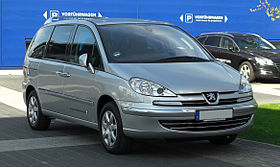Lancia Phedra
| Eurovans | |
|---|---|

Peugeot 807 (facelift), one of the four Eurovan versions
|
|
| Overview | |
| Manufacturer | Sevel Nord |
| Production | March 1994 – June 2014 |
| Assembly | Lieu-Saint-Amand, France (Sevel) |
| Body and chassis | |
| Class | Large MPV (M) |
| Body style | 5-door MPV |
| Layout | Front-engine, front-wheel-drive |
| Related | Sevel Nord vans |
| Chronology | |
| Successor |
Fiat Freemont Lancia Voyager Citroën Space Tourer Peugeot Traveller |
| First generation | |
|---|---|

1998 Citroën Evasion
|
|
| Overview | |
| Also called | Citroën Evasion Citroën Synergie Fiat Ulysse Lancia Zeta Peugeot 806 |
| Production | March 1994 – February 2002 |
| Body and chassis | |
| Platform | Sevel Nord vans |
| Second generation | |
|---|---|

Fiat Ulysse (second generation)
|
|
| Overview | |
| Production | June 2002 – June 2014 (Citroën and Peugeot) June 2002 – November 2010 (Fiat and Lancia) |
| Body and chassis | |
| Platform | Sevel Nord vans |
| Dimensions | |
| Wheelbase | 2,823 mm (111.1 in) |
| Length | 4,727 mm (186.1 in) (Peugeot 807) 4,750 mm (187.0 in) (Lancia Phedra) |
| Width | 1,854 mm (73.0 in) (Peugeot 807) 1,863 mm (73.3 in) (Lancia Phedra) |
| Height | 1,752 mm (69.0 in) (Peugeot 807) |
| Curb weight |
|
The Eurovans are a family of large MPVs from the Citroën, Peugeot, Fiat and Lancia marques that were produced at the jointly-owned Sevel Nord factory in France. The term Eurovan was not used by the brands themselves in sales literature, but rather by the motoring press to refer to the vans collectively. It was launched in March 1994, and production ceased in November 2010 for the Fiat and Lancia models, and in June 2014 for the Citroën and Peugeot siblings.
The Eurovans differ little technically and visually, being a prime example of badge engineering. They share mechanicals and body structure with the Sevel Nord light commercial vans, the Citroën Jumpy (Dispatch), Fiat Scudo and Peugeot Expert.
The first generation Eurovans were marketed as the Citroën Evasion, Fiat Ulysse, Lancia Zeta and Peugeot 806. The second generation models were all renamed, except the Fiat Ulysse, with the nameplates now Citroën C8, Lancia Phedra and Peugeot 807.
The first generation Eurovans were introduced in 1994. They are smaller than American vans, like the Chrysler Voyager, which is also available in Europe. In contrast to the Toyota Previa and like American minivans they had sliding rear side doors, a trait they share with their commercial siblings. In spite of the fact that the Voyager also came in the "Grand" versions with elongated body and wheelbase (and the Espace followed suit in 1997), the Eurovans only came in one size.
The Eurovans were almost identical, the differences consisting in different grilles, lower tailgates/taillights, wheel covers/alloy wheels and exterior and interior badging, as well as different trim levels. In October 1998, the Eurovans were mildly facelifted.
Inside, the gear lever was mounted on the dashboard rather than on the floor, and the handbrake is on the door side of the driver's seat, which allowed for the removal of middle console and opened up a passage between the front seats. The seating configurations included two fixed seats in front and three individual removable seats in the middle row, along with optional two individual removable seats or a three-seater bench in the third row.
...
Wikipedia
